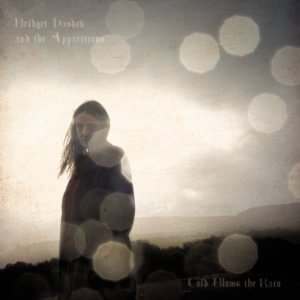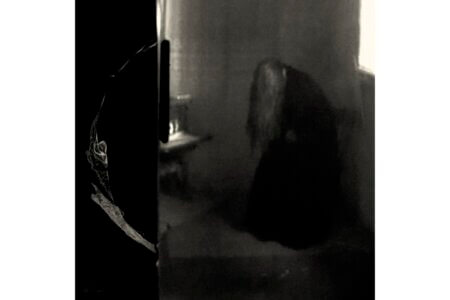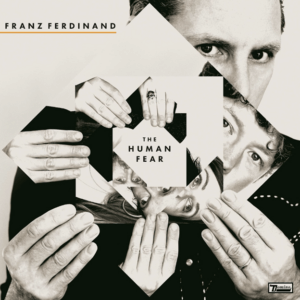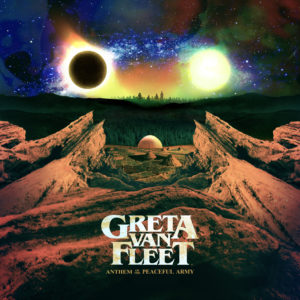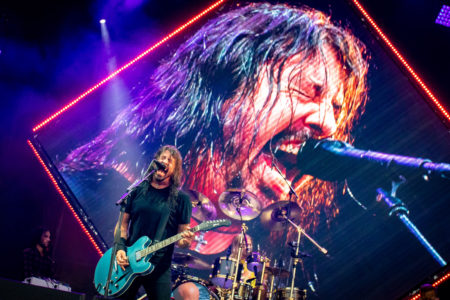Greta Van Fleet Are Doing Their Own Thing

After a controversial and polarizing debut, Michigan rock revivalists Greta Van Fleet have returned with their sophomore album The Battle at Garden’s Gate. The new album takes a cinematic approach to rock n’ roll and tells the story of a world similar to ours but on a much darker trajectory. The band, consisting of twins Josh Kiszka (vocals) and Jake Kiszka (guitar), their younger brother Sam Kiszka (bass), and longtime family friend Danny Wagner (drums), worked with Hollywood mega-producer Greg Kurstin (Sir Paul McCartney, Foo Fighters) to reach their new sound. Northern Transmissions spoke to Jake Kiszka and Danny Wagner about the band’s dynamics, recording the new album, and the importance of physical music formats in the digital age.
Embarking on a large-scale cinematic album with a new producer would typically be daunting as it is, but the recording experience was elevated through the band’s use of analog tape for the very first time. No computers and no Pro Tools, just the band playing live with recording technology from back in the 70s.
“The sound is unparalleled,” says Wagner. “It really makes you work for your creation. We recorded pretty much the whole album live to tape and we came out of it better musicians.” Considering their classic rock sound, the option to use tape wasn’t even discussed between the band and Kurstin, it was assumed.
“The first day we showed up, they had the tape machines set up and we didn’t even have the conversation… we kind of all looked at each other like ‘Uhh are we recording to tape? Because that sets the bar pretty high’” says Wagner.
Given that digital recordings strive to achieve sonic perfection, Greta Van Fleet wanted to steer clear of manufacturing a sound that didn’t honestly represent them as a band. As Kiszka points out, using tape and allowing minor imperfections to seep through, kept the album honest and better represented the band’s musical abilities.
“I think that’s something not only we were okay with but beyond embraced the fact that there’s going to be mistakes and that’s going to be the best part!” He continues, “Every time something like that happens, when you make a mistake or do something that wasn’t necessarily intentional, it turns out better than what it was originally going to be.”
While Kiszka might be the band’s designated guitarist, the writing process reflects a totally different dynamic. Every member of the band contributes to all aspects of songwriting. Whether it’s Jake and Josh collaborating on lyrics or Sam and Danny writing guitar parts; no one person sticks solely to the instruments they’ve been assigned. The camaraderie in their music reflects the true essence of what it means to be a band.
“It’s really amazing. It’s interesting to consider the fact that we’re all multi-instrumentalists in a certain way but it’s like a language, you know? Especially between Daniel and myself because we can trade-off concepts and bits and pieces of songs” says Kiszka, who goes on to explain how the band’s “laissez-faire” philosophy has contributed to their success when writing. Unlike the relationship between bandmates, the new album The Battle at Garden’s Gate is anything but simple. On their sophomore LP, the band went for an expansive collection of songs using mythology and religion to tackle themes of environmentalism, capitalism, and escapism.
Their cinematic approach to rock n’ roll includes a variety of influences from the fields of folk, classical, and world music, with the pillar of their sound still being based in the blues. Lyrically, the album stays away from the typical muses of rock music. Instead of exuberant feelings of lust and desire, the dystopian narrative throughout the album warns of a dire future that cannot be fixed. Small moments of joy are seen on “Trip the Light Fantastic” which blends spiritual mantras into the bridge and “My, Way Soon” which is an ode to the band’s travels. Despite that, the story told on Garden’s Gate otherwise has a much heavier presence.
Kiszka notes, “It’s interesting to consider the fact that all of these songs tell an individual story. If you put them all on their own, they are very independent sounding yet they could all live in the same sonic world.” He adds, “It sort of doesn’t matter how you orientate the songs, it’ll just be telling the same story in a different way.”
Given the pandemic and lack of global touring, the band was able to give their creative energy to the visual aspects of the new album. They’ve spent the better part of the year filming, editing, and co-directing their own music videos, working (then re-working) all the album artwork, and creating a symbolic system to identify each new track.
“The album itself seems like a very biblical or mythological representation so that was an interesting thing. We suggested instead of associating song titles with a numerical system to actually create a symbology to represent the songs … it all kind of plays into this story the album tells” explains Kiszka.
With the majority of millennials and gen-z music fans using digital platforms to access their music, the appreciation for album artwork has dropped significantly. Not only was the album’s cover a big discussion within the band, but all the corresponding visuals and art that comes within it. Fans who buy physical formats of the new album were also top of mind when addressing how to visually represent the new material.
“We talked with multiple people about designing this really extravagant, very colourful cover … it kind of looked more like Anthem of the Peaceful Army and we just kept going back and forth” explains Wagner. “Then one of us said ‘What if we just keep it really simple and make it very bold!’”
Kiszka adds, “This album in particular, the actual physical form of it, I think it’s going to be really incremental for our generation. Especially shaping the evolution of physical formed music, I think it’ll be interesting to see what happens with that,” a bold statement from the guitarist but not unwarranted. The band’s debut album, despite being met with mixed reviews, still sold over 80,000 copies in the US during its first week; a rare achievement for a young band in the digital age.
Whether this album is streamed online or added to your record collection, the true home for this music is on stage. Pre-pandemic, they’ve sold over one million concert tickets. Performing this album live is a top priority for the band and as Kiszka says, “The ethos of our existence is in touring.”
Latest Reviews
Tracks
Advertisement
Looking for something new to listen to?
Sign up to our all-new newsletter for top-notch reviews, news, videos and playlists.
